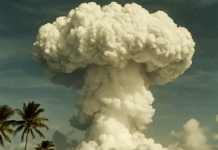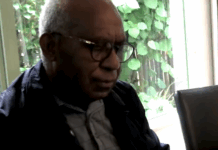
Policy failure over the last eight years — including a massive cut to the ABC’s international funding — has weakened Australia’s voice in the Pacific to its lowest ebb since the Menzies government established the first radio shortwave service across the region more than 80 years ago. Now, with China’s media expansion and the recent Solomon Islands crisis, it is obvious that Australia can’t afford to waste any more time in properly re-establishing its media presence and engagement with our Pacific neighbours. A new parliamentary report outlines a way forward, but the Coalition government has not yet pledged any substantial funding. Labor has promised an extra $8 million a year for the ABC’s international operations if it wins the federal election tomorrow. Former ABC international journalist Graeme Dobell, now with the Australian Strategic Policy Institute (ASPI), outlines the latest developments.
ANALYSIS: By Graeme Dobell
Australia’s polity grapples with the need to remake and rebuild our media voice in the South Pacific.
Domestic political battles and budget cuts have degraded the central role Australia played in islands journalism in the 20th century. Australia’s media voice in the South Pacific is at its weakest since Robert Menzies launched the shortwave radio service in 1939.
Now we must reimagine that role and empower that voice for the 21st century — a new model of talking with, not to, the South Pacific.
The policy failure that has so weakened our voice in the past decade had one deeply familiar element — recurring Oz amnesia about our interests, influence and values in the islands.
See the amnesia lament offered by a Canberra wise owl, Nick Warner, in his Financial Review op-ed about “Australia’s long Pacific stupor’”: “For two generations, since the end of World War II, Australia has squandered the chance to build deep and enduring relations with our neighbours in the South Pacific. And now it’s almost too late.”
This is a candid view from the heart of the Canberra system. You don’t get much more plugged in and powerful than Warner, who served as our top diplomat in Papua New Guinea, led the Regional Assistance Mission to Solomon Islands, and then headed the Department of Defence, the Australian Secret Intelligence Service and the Office of National Assessments.
‘Stupor’ history framing
Warner’s “stupor” history frames his diagnosis of how China could clinch a security treaty with Solomon Islands:
“China is now seemingly entrenched in Solomons and will also be looking for other opportunities for a base elsewhere in the Pacific. But, for better or worse, Pacific politics seldom provide certainty. It’s not too late for Australia to shore up its place in the South Pacific and to protect its strategic interests.”
The need to “shore up our place” that Warner points to brings us back to a specific example of the stupor/amnesia — the degrading of our media voice in the islands and the role of the Australian Broadcasting Corporation.
In the South Pacific, Radio Australia and the international television service, ABC Australia, still do great work. But they have only a third of the budget they enjoyed a decade ago. Underline that stupor/amnesia fact: spending on the ABC as our Indo-Pacific media voice has been cut by two- thirds.
In 2014, the Abbott government hacked into the ABC by killing funding for international television, a sad, bad and dumb decision that also decimated Radio Australia.
Political payback in Canberra produced a gang-that-couldn’t-shoot-straight tragedy in the South Pacific. The Abbott aim was to scratch the anti-Aunty itch, but he badly wounded a major instrument of Australian foreign policy. The damage was compounded when the ABC turned off shortwave in 2017; here again was a domestic focus that damaged our regional interests.
For an account of all this, see ASPI’s “Hard news and free media as the sharp edge of Australia’s soft power“.
Aunty as the villain
In this long-running melodrama with elements of dark comedy, a valiant ABC is also a victim — with foes instead seeing Aunty as villain. What a long run the drama has had: three generations of Murdochs have warred with Aunty, starting in the 1930s with Keith Murdoch’s bitter fight against the creation of an independent ABC news service.
A re-run of the domestic battle devaluing our international voice happened with Labor’s election campaign launch last month of its Indo-Pacific broadcasting strategy, promising the ABC an extra $8 million a year for international programmes, plus a review of whether shortwave should be restored.
Labor’s idea is a good first step to restart Australia’s conversation with the islands, Jemima Garrett writes, but it “seems to be simply pushing out more ‘Australian content’ and crowding the regional airwaves with ‘Australian voices’. This is ‘soft power’ in a crude form – a one-way monologue when what is needed is a dialogue — a 21st century conversation in which Australia and Australians talk ‘with’ and not ‘to’ our Pacific neighbours.”
Preferring hard power to soft power, Prime Minister Scott Morrison called Labor’s policy “farcical”, saying that in the South Pacific, “I sent in the AFP [Australian Federal Police]. The Labor Party wants to send in the ABC, when it comes to their Pacific solution.”
Australia, of course, needs it all—the AFP and the Australian Defence Force, but also the ABC.
In this argument, I declare my love of Aunty. I worked as a journalist for Radio Australia and the ABC (1975–2008) and had the huge privilege of spending much time as a correspondent in Southeast Asia and the South Pacific.
I did break the habit of a lifetime by putting the boot into Aunty when it switched off shortwave. The ABC had damaged its international role, set by parliamentary charter, in favour of its domestic responsibilities.
Soft-power thinking
Labor’s soft-power thinking is work in the minor key compared to the recent effort of parliament’s Joint Standing Committee on Foreign Affairs, Defence and Trade.
In the final sitting week before the start of the election campaign, the committee issued its report “Strengthening Australia’s relationships in the Pacific”. The media recommendations were the most ambitious to come out of Canberra in many a day:
“The Committee notes the media environment within the Pacific is becoming more contested, and recognises Australia has a national interest in maintaining a visible and active media and broadcasting presence there. The Committee recommends the Australian Government considers steps necessary to expand Australia’s media footprint in the Pacific, including through:
– expanding the provision of Australian public and commercial television and digital content across the Pacific, noting existing efforts by the PacificAus TV initiative and Pacific Australia;
– reinvigorating Radio Australia, which is well regarded in the region, to boost its digital appeal; and
– consider[ing] governance arrangements for an Australian International Media Corporation to formulate and oversee the strategic direction of Australia’s international media presence in the Pacific.’
I own up to the idea for the creation of an Australian international media corporation, contained in my submission [No 21] to the inquiry. The committee’s findings and the idea of a new international body, to build on the ABC foundations, will be the next column in these musings on the Oz media voice in the South Pacific.
This article was first published in The Strategist journal of the Australian Strategic Policy Institute (ASPI). Graeme Dobell is ASPI’s journalist fellow and this is republished with the author’s permission.













































